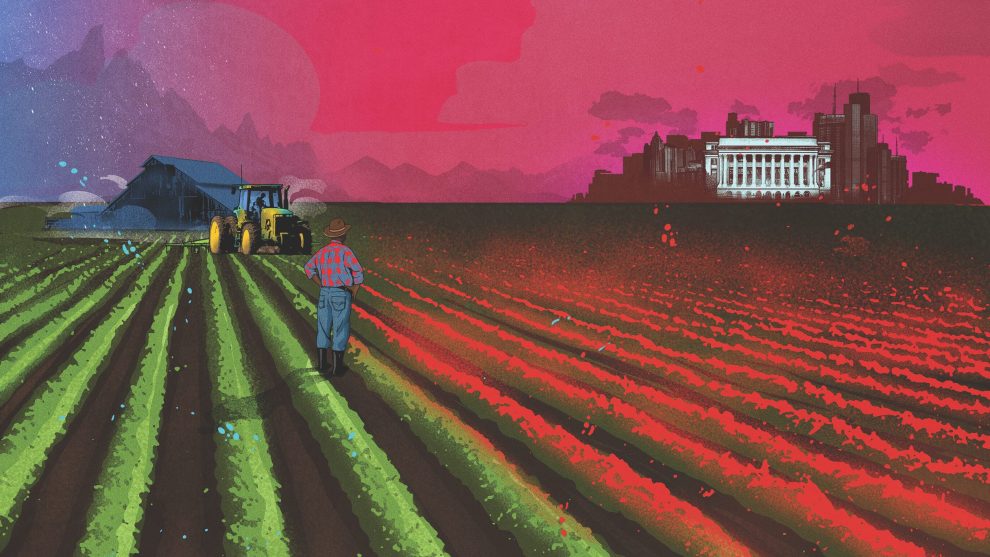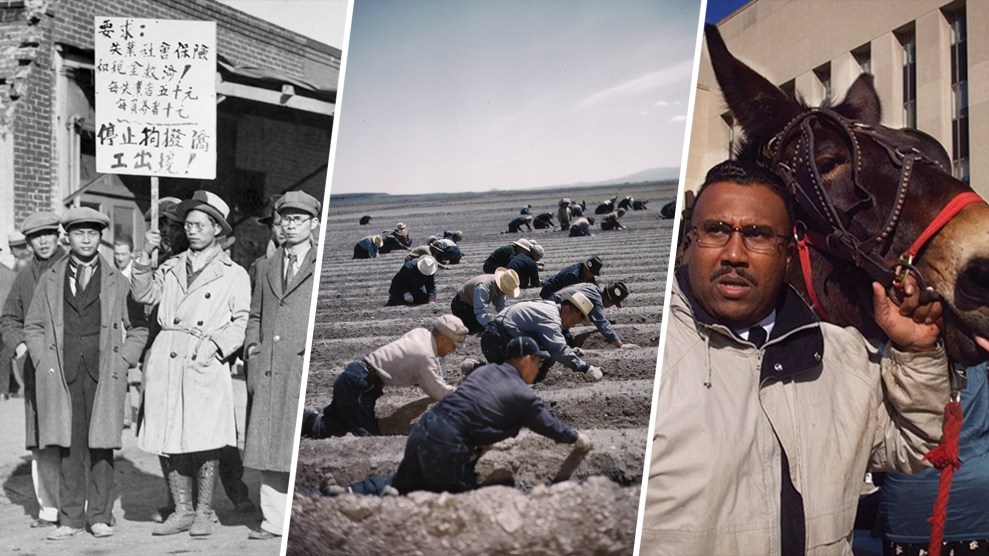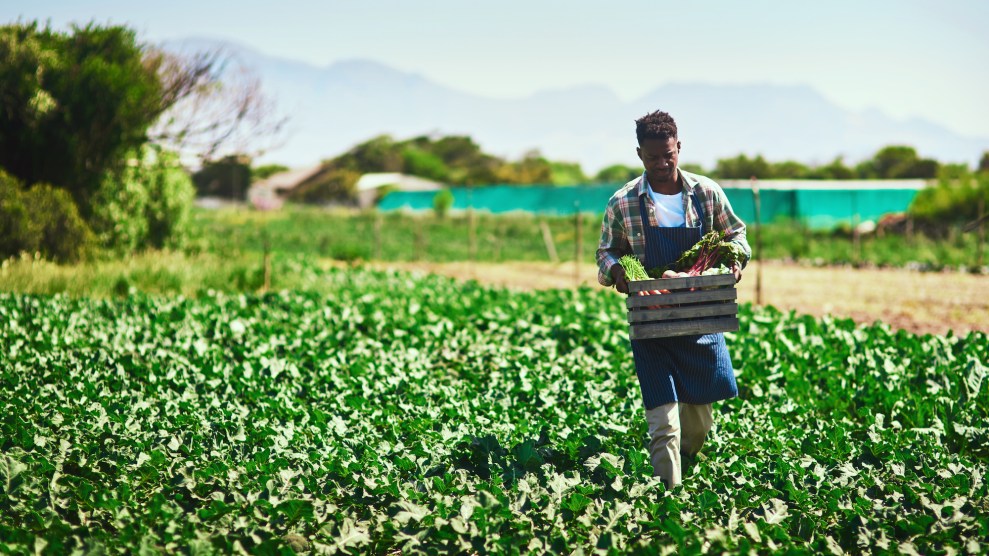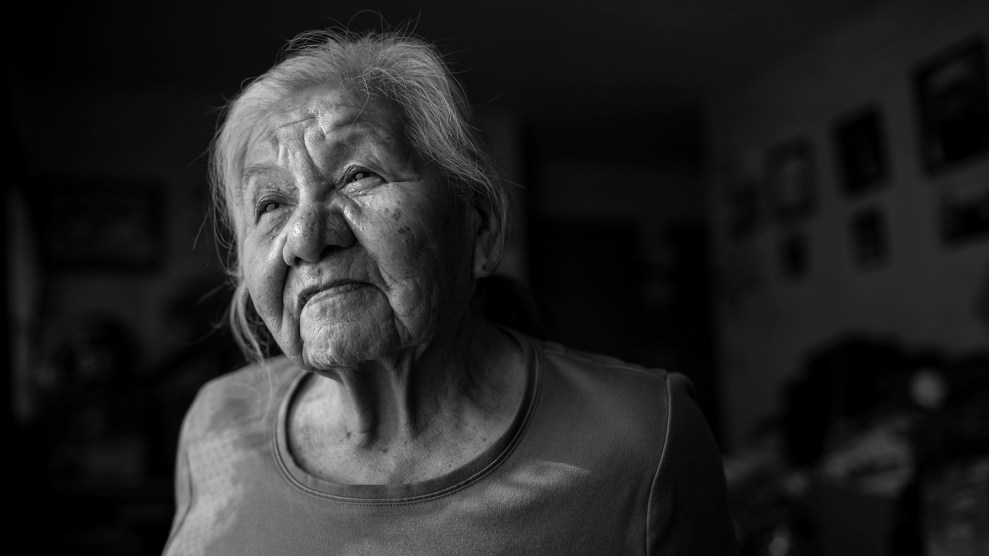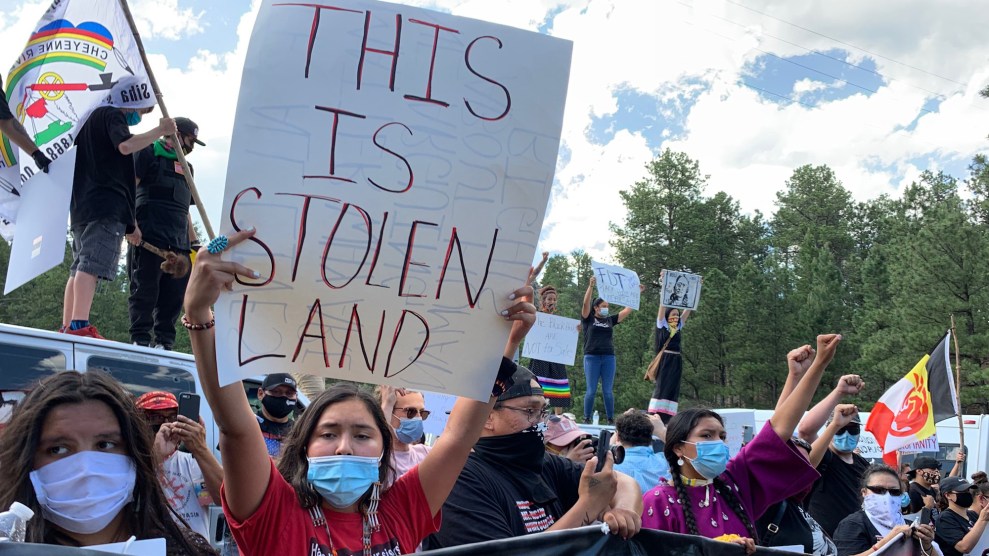
Native American protesters and supporters gather at the Black Hills, now the site of Mount Rushmore, on July 3, 2020, in Keystone, South Dakota.Micah Garen/Getty
Land Back, a call to restore land stewardship to Indigenous peoples, has been a demand since the land was originally stolen. In recent years, the term has cropped up more and more in social media feeds. For Corinne Rice, a consultant and journalist from the Lakota and Mohawk Nations who lives on the Rosebud Reservation in South Dakota, working within the movement involves a lot of online education.
“You see a hashtag Land Back or you see people with Land Back shirts, or there’s jewelry,” Rice, who writes for PowWows.com, says. “Natives all over the US have kind of been saying Land Back in a way that’s gaining attention, but not a lot of people really knew what it meant. So, as educators, we were getting this question quite frequently from non-Natives via social media. ‘What does that mean? You want us to just give you the land? Then where are we supposed to go?’”
Many people can support the movement and stay right where they are, Rice says. Land Back has many meanings but perhaps most importantly involves allowing Natives to make decisions about land so they have a say in things like the construction of destructive oil pipelines. Rice says a farmer, for instance, could deed her property to a tribal nation but continue her work on that farmland and even partner with the tribal nation.
Last year, Rice began working as a liaison for people considering transferring their land and those with the legal expertise to get it done. She’s teamed up with her brother Andrew Perera, who holds a masters of jurisprudence in Indian Law.
The two often use humor and sass to educate people about the Land Back process. One Instagram slideshow they posted in July explains the court case Johnson & Graham’s Lessee v. M’Intosh, which ruled that Tribal Nations hold no title to land and have only a “right to occupancy.” Rice and Perera posted a card that read: “In 1823, the Supreme Court saw a case that started what many know to be the Holy Trinity of fucking over Tribal Nations and sovereignty,” along with an image of Alexis, a character on the TV show Schitt’s Creek, saying “hell no.”
As a consultant, Rice has walked people through the land transfer process at conferences with organic farmers and meetings with corporate executives. I spoke with her earlier this month about how people can be allies to Indigenous communities and the urgency of Land Back in today’s climate crisis. Our conversation has been edited and condensed.
How exactly does Land Back work?
It’s going to be different for every case. Everyone’s land is going to be in a different tribal nation, which means every sovereign nation has a different legal process for doing that Land Back exchange. But nine times out of 10, [the process] is still going to require that that tribal nation submits their land into deed of trust with the US government. The US government holds land for tribal nations in a trust—which is demeaning, honestly, because its mindset is that the government looks at tribal nations as not capable of managing our own land. And so they will hold it for us the way they would hold something for a ward of the state. That’s not honoring someone’s sovereignty. But it’s the way it is right now until things can be fixed or changed in the future.
That being said, each person’s process will be different. It is always beneficial to have someone with experience in Indian law because your legal paperwork is going to need to have tribal-specific verbiage. If someone is a lawyer or someone is going to help you through that process, and they don’t understand tribal-specific verbiage, it makes things more complicated and drawn out. But the process of giving that land back is absolutely possible. And it will be done on an individual basis.
How much has the Land Back movement tried raising awareness to lawmakers and the Biden administration?
There are lots of organizations working on the same issue. There’s NDN collective, which is based out of Rapid City, South Dakota, which is focused primarily on the side of Land Back which is about honoring treaties. So there’s public lands, which have treaties that should be honored, in which those indigenous nations would be in charge of that land and are not. Currently, it’s like 80 percent of the western US would be tribal-protected lands, but are not because they’re not honoring those treaties.
In the Constitution itself, it states that we must honor those treaties. I do understand why that has been ignored— because of profit. Those public lands are $9 billion of our US budget. And that comes from the wood that is there, logging, right? And cattle making, like leasing the land to cattle grazers, that kind of thing. So, I mean, why would the US government honor those treaties if it means losing $9 billion worth of funds for our operating budget? So we know why the treaties are not honored, we’re not stupid. But we also hope that eventually a lawmaker or somebody will look at those treaties and honor them, and say, ‘okay, you’re right, you know, we really do need to, if we’re going to take the Constitution seriously, we need to take the treaty seriously.’ That’s really what it boils down to.
But organizations like NDN Collective really work hard, specifically on trying to get the treaties for the Black Hills honored. In fact, there was a huge uproar when Trump came, I think it was this past July 4, he came out to the Black Hills, and NDN Collective’s executive director got arrested and charged, because they were protesting and saying ‘these are tribal lands, we’re not gonna give you permission to be here.’ And that’s an exercising of their sovereign rights to do that. But they were arrested and charges were recently dropped. But it was still like this spark to the conversation of ‘Whose land is it really? And what does that mean? What are treaties? How do we honor treaties?’
Then there are organizations in California who are working to return land to tribal nations. But it gets complicated, especially if somebody is a state-recognized tribe and not a federally recognized tribe. State-recognized tribes don’t have land held in trust by the US government, they have to become an entity and then purchase the land back themselves.
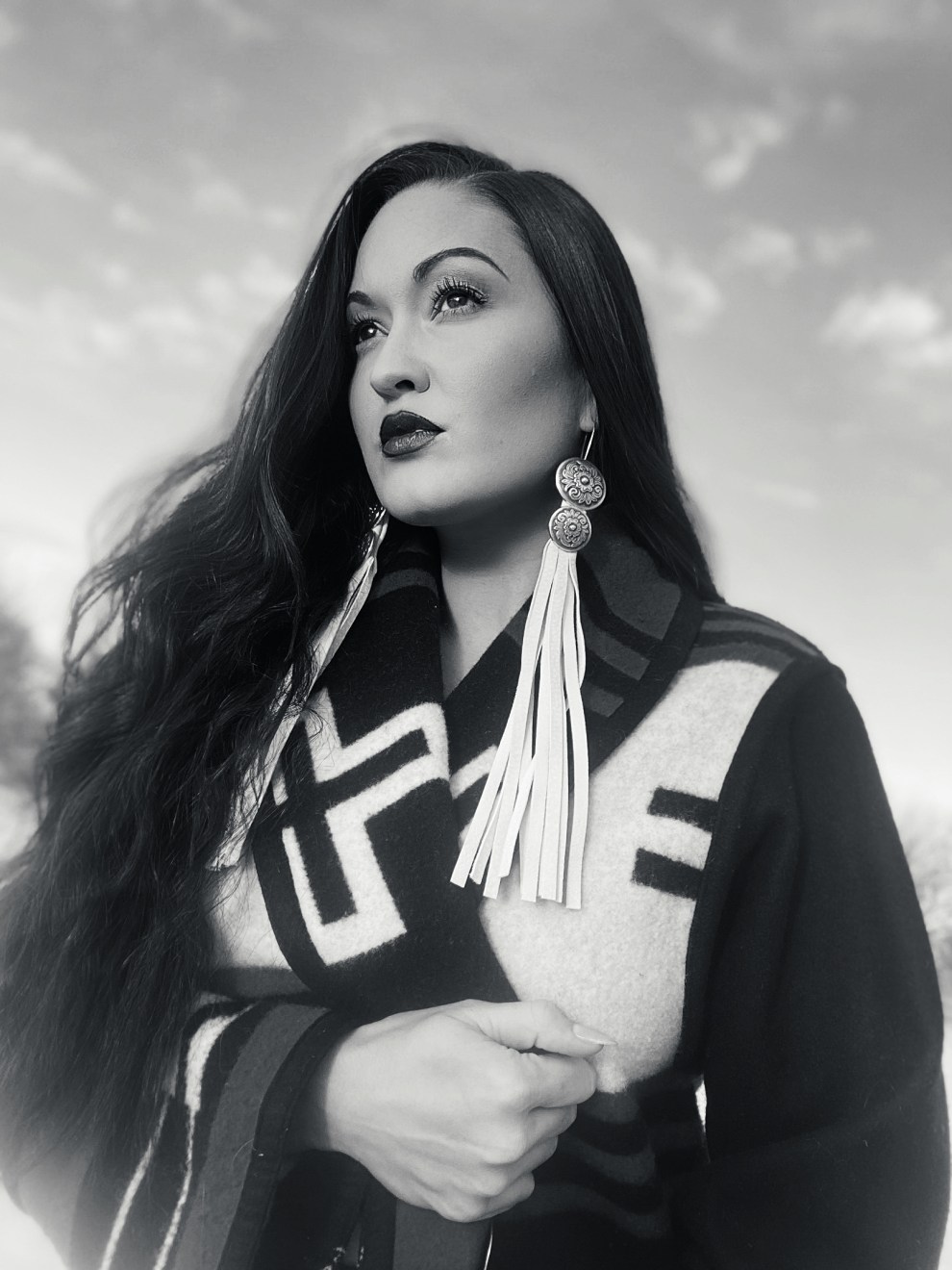
Have you been involved in many individual cases?
I don’t have a degree in Indian law or know how to walk anyone through that legal process. But what I can do is say, ‘Okay, here’s the information for you.’ I’ve been this liaison in between somebody who wants to give land back or a corporation that wants to give land back, or who is interested in learning about it, and then directing them to the legal individuals who can walk them through it.
I won’t say a name yet, because it’s not finalized, but there are some very large corporations who are interested in trying out land back. And what that means is, okay, so we like the idea of giving property back to a tribal nation, because one, it will save on property taxes, which is oftentimes going to save that company money. So there’s a negotiation and a discussion happening for a large corporation that I can’t say the name of yet, but to possibly give the land their warehouses are on back to that tribal nation; study it for about five years; track what their savings are; and then use that to discuss maybe even larger scale Land Back.
How do you feel about tax savings being the reason behind their interest?
For me, I think the means justify the ends. I don’t mind that their incentive is a savings in taxes. We have to speak their language to get them to hear us.
What do discussions about Land Back look like in your own circle and among your family?
We talk at our kitchen table about all kinds of things. I’m Lakota and Mohawk. And so Land Back isn’t some distant thought for anyone in my family. It’s a very real hope. We’ve talked very frequently about, I wonder what would this community be like? Or I wonder what the land looked like before it was all farmlands. And it’s not a distant notion to us, because it’s our lands. So the hope and the drive exists.
We went to the Black Hills recently for a ceremony called Wakinyan Agli, which means return of the thunders. And that happens at the spring equinox when the thunders come back. And the Wakinyan are the thunder beings that we as Lakota people believe in. And I remember driving through those hills, and knowing that the sacred place that we go to pray right now, to the Wakinyan, is a tourist site. People go up there all the time to take pictures or do whatever. But it used to be a place where we would go to church to have a vision on the hill, or to speak with those beings intimately and personally. But it’s not that place anymore. It’s not, it’s still sacred, but it’s not private. It doesn’t hold the same reverence that it did, because it’s just frequented by people who are either unaware, or who are just being disrespectful in that space.
It’s just this constant thought of, well, I wonder what it would be like, if I could have walked up to that hill, with it still holding that same privacy without worrying about oh, here’s a settler descendant who’s going to come here and watch me and be like, ‘what is that person doing?’
I’ve seen talk that the Land Back movement also involves dismantling white supremacy and the prison industrial complex and climate action. How do you chip away at those forces?
I mean, really a little bit at a time. The first step is getting somebody in power to think about it. So, okay, a white male CEO of some large corporation—I hold every privilege that could possibly exist at this time, right? But maybe I see a lesson on Land Back or hear about this Land Back movement and something is starting to stir in me. So that’s where we start. We hope that someone who holds privilege and power can lead with empathy and look at something and think ‘I have the potential to be the leader in a new thought leadership of doing better. And working in a community with Indigenous people, I hold this power, what am I going to do with it?’
We hope that they step into a position of empathy where they can say, ‘I’m going to do better because I can make a difference.’
That’s the first step. And that’s oftentimes the hardest one, getting someone to begin the dismantling of white supremacy. A lot of people benefit from white supremacy without being white supremacists. Right? You don’t have to be someone who is racist, or someone who is operating in that mindset to still be benefiting from a system that was created on those ideals. But you can still be the one who initiates the change of mindset because of the power you hold.
